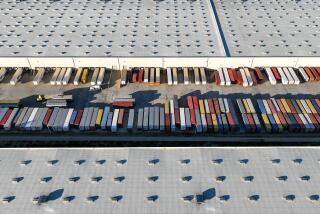Hollywood Wins Exemption on Set Permits
Hollywood filmmakers scored a regulatory victory when a bill to exempt movie set construction from Cal/OSHA permitting requirements unanimously passed the Legislature.
The bill, SB 987, approved late Thursday, would resolve a heated debate between the entertainment industry and state labor officials over whether or not sets can be constructed safely without requiring the same âactivityâ permits that protect workers in the construction industry.
The legislation is expected to be signed into law by Gov. Pete Wilson and take effect Jan. 1.
The bill would exempt the film industry from requiring such permits until Jan. 1, 2000. If, after that date, the industry reports that three or more serious set construction accidents--that could have been prevented by a permit--have occurred within a single calendar year, employers would be required to obtain an annual permit to build and dismantle sets 36 feet tall or taller.
A key factor in the billâs passage was the movie industryâs safety record. After reviewing data for a five-year period, along with anecdotal information dating back to the late 1970s, Cal/OSHA could not find any record of a serious injury resulting from movie set construction.
âObviously, weâre glad to have the bill through the Legislature,â said Gini Barrett, senior vice president for the Public Affairs Coalition of the Alliance of Motion Picture and Television Producers. âItâs important that California continues to clean up and streamline regulations for all of its industries, and weâre pleased that they recognize the unique differences between sets and permanent buildings.â
The dispute originated two years ago, when a Cal/OSHA inspector new to the entertainment industry cited producers of âThe Indian in the Cupboardâ for not having an activity permit. Cal/OSHA based the citation on a section of the California Labor Code that requires such a permit for the construction or demolition of any structure that is 36 feet or taller. Previously, the word âstructureâ had not been interpreted to refer to temporary plywood movie sets.
State labor officials tried to enforce the provision, but the film industry fought it, saying such permit requirements are unwarranted and prompt producers to work outside California.
The bill was supported by major production entities such as Disney, Universal and the TV networks, as well as the affected labor unions: the International Alliance of Theatrical and Stage Employees, the International Brotherhood of Electrical Workers Local 40, the Teamsters Local 399 and the Los Angeles County Federation of Labor.
The bill passed the Assembly by a 71-0 vote and the Senate by a 39-0 vote.
More to Read
The biggest entertainment stories
Get our big stories about Hollywood, film, television, music, arts, culture and more right in your inbox as soon as they publish.
You may occasionally receive promotional content from the Los Angeles Times.










